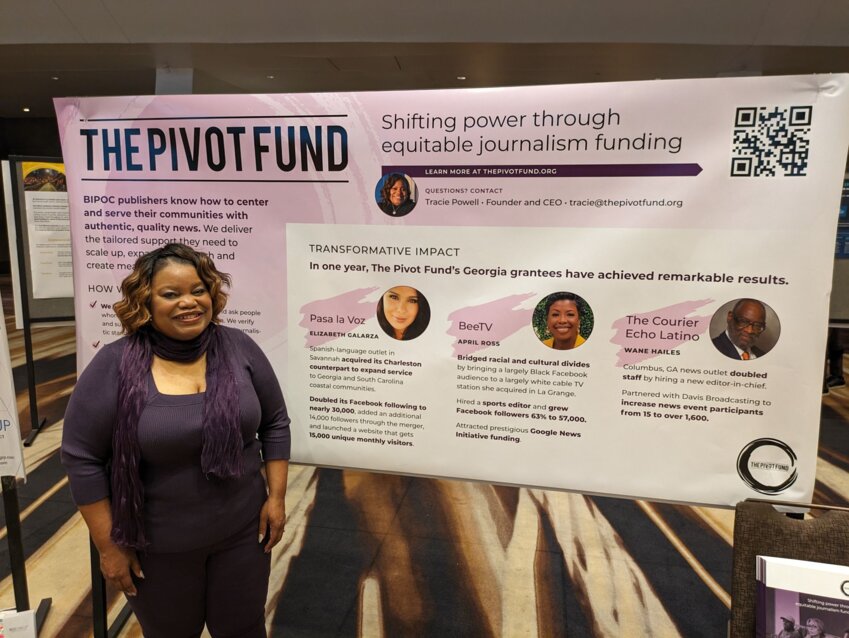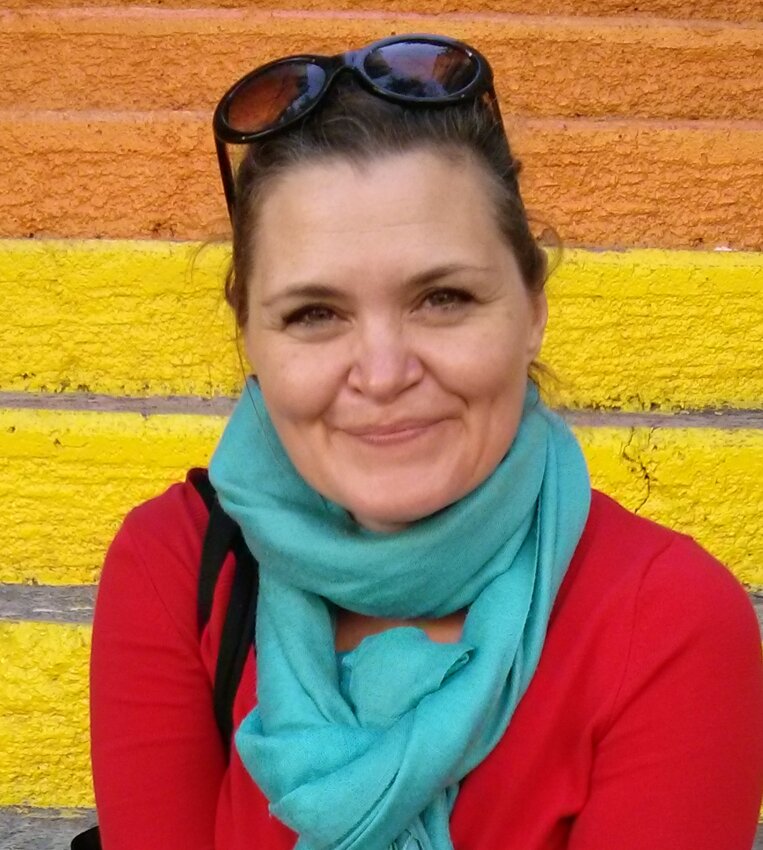“Journalism — let me be clear — traditional ‘big J’ journalism is one of the few businesses that doesn’t center on its customer,” said Jean Marie Brown, The Pivot Fund’s director of research, learning and evaluation.
“Over the years, mainstream news has basically said, ‘This is what we think you should know. Period.’ — rather than making an effort to find out what the customer might actually want or need, the way Ford might when developing a new car. And a lot of people have turned away. We need to change that. For journalism to be relevant, we need to meet them where they are. For us, that means learning more about what the ‘little j’ journalists are doing.”
Brown, a longtime newsroom leader who worked at The Charlotte Observer, Knight Ridder and McClatchy newspapers, is leading an ambitious research project by The Pivot Fund focused on the Great Lake states. The project aims to better understand the news landscape in the region and help identify news and information sources that have specifically earned the trust of communities of color.
Pivot began its Midwest survey in Minnesota in early 2024, and Brown said it should be completed by July. The project will also include news ecosystem studies in Michigan, Wisconsin and Illinois.
This initiative marks an expansion for The Pivot Fund, launched in 2022 by Tracie Powell. Powell, a former Shorenstein Center research fellow at Harvard’s Kennedy School and Georgetown University Law Center graduate, launched the digital news outlet Digitocracy before becoming the founder and CEO of The Pivot Fund. The Fund aims to raise $500 million to support diverse local newsrooms nationwide. It focuses on identifying and investing specifically in local news outlets that serve communities of color.
Pivot’s Midwest project was announced in January of this year, and it is funded by multiple foundations, including the MacArthur, Joyce and McKnight foundations — all founding members of the Press Forward local news initiative. Press Forward’s mission is to raise $500 million to bolster local news nationwide. In the initial announcement, the McKnight Foundation said it would utilize insights from The Pivot Fund survey in Minnesota to shape its funding decisions in the region.
Data is critical for finding solutions.
The Medill annual survey, State of Local News, has long been cited as a key benchmark in assessing the health of local news across the country. It is the source of many headlines and the talking point that the country loses 2.5 local newsrooms each week. While the study does call attention to the massive newsroom losses we’ve seen over the past decade, some critics of the survey have pointed out that it misses some newer, smaller publications that are serving communities with needed news and information.
Organizations like The Pivot Fund and other researchers and philanthropists are looking to dive deeper to better understand the broader news and information systems the public uses today. News “landscape” or “ecosystem” surveys are a methodology researchers and funders use to understand what is happening in communities related to their news consumption and to learn about any unmet needs in an effort to direct their giving.

In March, Silvia Rivera, MacArthur’s director of local news and liaison to Press Forward, told E&P that much of her work in 2024 would focus on gathering information from diverse sources. This work will shape MacArthur’s funding strategy to support Press Forward’s mission of strengthening local news in the coming years. “I want to build a thoughtful strategic plan for our giving that’s enforced by real data,” she said.
In early June, the Knight Foundation announced it would be funding another effort by the Local News Impact Consortium, a group of academics at six journalism schools around the country, with a goal of standardizing the methodology for these studies while creating tools that any local researcher could use to generate their own analysis.
What distinguishes The Pivot Fund is its dedication to understanding and supporting newsrooms that serve communities of color. These communities are often overlooked or misrepresented in mainstream media, making this focus crucial for fostering inclusive and accurate news coverage.
“We need to better understand how people consume news, and The Pivot Fund has a unique lens to help with that,” said Hugh Dellios, who manages the Journalism program at the Chicago-based Joyce Foundation. “By asking communities of color who they trust for their news and information, they can surface important players that we might miss because they don’t always look like traditional news publications.”
The art of the survey
The Pivot Fund conducted its first detailed study of the news landscape in Georgia in 2022. Rather than solely chronicling traditional newsrooms, the team developed a system to dig deeper to find gaps in community coverage and identify non-traditional news and information sources that people relied on to understand how to bridge those gaps and provide support.
The team uses census data to more fully understand the communities that make up a region. Then, they conduct in-depth research, including on-the-ground interviews with community members, to learn what information sources each individual or sub-group might be using to get information. For example, surveys have been conducted in Minnesota with Somali, Hmong and Latino community members.

“We put an emphasis on direct listening sessions to help us better understand, not only what sources they turn to, but also to get a sense of their feelings about the news. What is and is not connecting with them,” said Tracie Powell, The Pivot Fund founder and CEO. “If we just conducted simple surveys of the bigger organizations in a region, rather than having these community level conversations, we’d be missing the most important part of the picture: what do people want and need, and what are they already using to get information.”
Powell said research by The Pivot Fund in Georgia revealed widespread mistrust of legacy news outlets among rural and minority communities. In contrast, hyperlocal news sources, often operating on social media platforms, have gained significant trust by addressing local information gaps. This includes newsletters, neighborhood and community social media accounts like Reddit, TikTok and Facebook. The team at Pivot said this shift in news consumption is particularly evident among younger audiences and communities of color.
Brown said it’s important to understand the impact of historical biases in news coverage when conducting this kind of research. “We need to grasp what a century of bias has done to once-small audiences that have now grown,” Brown said.

She noted that their surveys take about four to six months to complete due to the depth and breadth of information gathered. “We work with local community experts to conduct our surveys, which allows us greater access and a better understanding of what might be critically missing in the news ecosystem for diverse communities, and we gain knowledge about what they are using now.”
As a result of its 2022 survey in Georgia, The Pivot Fund invested $2 million in seven hyper-local news outlets that serve Black, Latino and Asian audiences. Powell said many who received Pivot's support would never have been on the radar of a traditional news media survey — let alone philanthropy. The organizations included Pasa La Voz Savannah, a small Facebook news outlet serving the Spanish-speaking community in Georgia and seeking to combat misinformation, and BEE TV in LaGrange, Georgia, that streams on Facebook and Spectrum cable. Both Black and white residents cited BEE TV as their go-to information source.
Powell is confident that Pivot’s latest survey in the Midwest will uncover additional under-the-radar and unconventional community news and information efforts deserving of support.
“This effort validates the successful model we developed in Georgia for identifying emerging news ecosystems,” said Powell. “The future of local news looks very different from its past.”
 Diane Sylvester is an award-winning 30-year multimedia news veteran. She works as a reporter, editor, and newsroom strategist. She can be reached at diane.povcreative@gmail.com.
Diane Sylvester is an award-winning 30-year multimedia news veteran. She works as a reporter, editor, and newsroom strategist. She can be reached at diane.povcreative@gmail.com.
Comments
No comments on this item Please log in to comment by clicking here